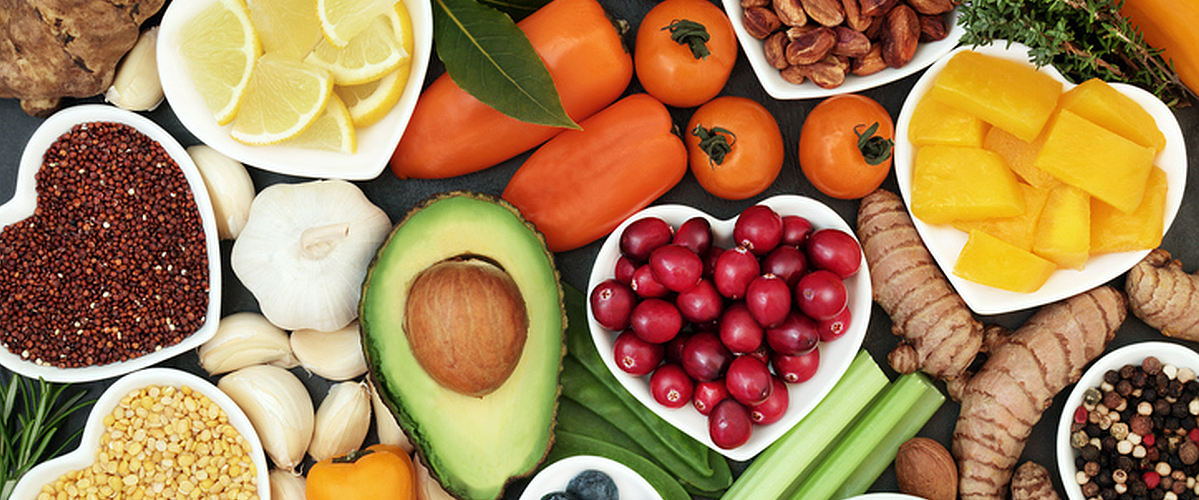The road to a healthier lifestyle begins with a few small steps. And what better time to start than American Heart Month?
In fact, eating better is one of the American Heart Association’s (AHA) Life’s Essential 8 steps for better overall heart health. Dr. Donald Lloyd-Jones, a professor of preventative medicine and spokesperson for the AHA, tells us that loading up on colorful fruits and vegetables, choosing whole grains, eating more plant-forward meals, avoiding unhealthy fats and reducing added sugar in our diets is a great way to get on the path to a healthier lifestyle.
Want to get started but don’t know where to begin? To help you out, we gathered together a list of our favorite heart-healthy foods, along with tips and recipes from our dietitians, chefs and other experts.
HEART-HEALTHY FOODS TO KNOW
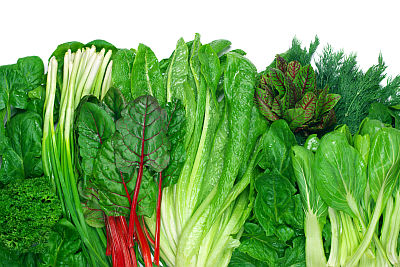
“From salads to stir-fry, these veggies are versatile and brimming with nutrients,” says Mackenzie Proctor, an Aramark Registered Dietitian Nutritionist (RDN) who specializes in bringing nutrition and wellbeing programs to college and university students.
Heart benefits: Dark leafy greens, for example, are rich in vitamins A, C, E, and K as well as the B-vitamins, fiber, iron, magnesium, potassium and calcium. In addition to other beneficial antioxidants, these greens are true superfoods for your heart.
Recipe to try: Harvest Kale Salad
2. Berries
“Berries such as strawberries and blueberries are a heart-healthy choice for breakfast, a snack, or a light dessert,” shares Colleen Tweedy, a K-12 Education RDN with Aramark.
Heart benefits: Berries are some of the healthiest foods you can eat, as they’re low in calories but high in fiber, vitamin C, and antioxidants. Many berries have proven benefits for heart health.
Recipe to try: Nutty Banana Berry Smoothie
3. Whole Grains
All grains start off as whole. But the more they are processed, the more their nutrients are stripped away. Check the packaging for the whole grain stamp from the Whole Grains Council, which tells you the food has at least half a serving of whole grains. If you’re dining with Aramark, just look for the “made with whole grains” leaf.
Heart benefits: According to the AHA, fiber from whole grains can help lower blood pressure and improve cholesterol levels. Choose whole grains over refined and you’ll enjoy more filling fiber combined with all of the other natural elements of whole grain nutrition.
Recipe to try: Barley and Vegetable Ragout
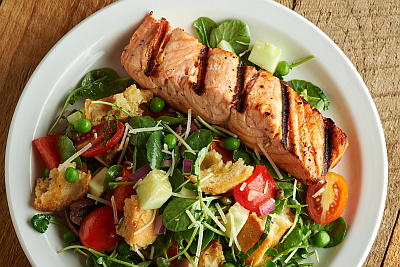
4. Fish
Any list of heart-healthy foods would be incomplete without fish. Fish is a great place to turn for a boost of omega-3 and omega-6 fatty acids. “We call these essential fatty acids because our bodies cannot produce them on their own. We need to get them from food,” explains Aramark RDN Amber Jay who works to support the Healthcare locations we serve.
The AHA recommends eating at least two servings of fish, particularly fatty fish, each week. Go for salmon, mackerel, herring, lake trout or albacore tuna.
Heart benefits: Omega-3 and omega-6 fatty acids have been shown to help support heart health, especially when they replace saturated fat. Bonus: Four ounces of fish contains about 17 grams of filling, muscle-building protein.
Recipe to try: Grilled Salmon and Panzanella Salad
5. Beans and Legumes
“Beans and legumes are a great source of plant protein and a cornerstone of vegetarian and vegan diets,” says Gaia Di Giacomo, a registered dietitian with Aramark. “They are high in minerals and fiber without the saturated fat found in animal products.”
Heart benefits: Eating beans may help improve your blood cholesterol, a leading cause of heart disease. This food group—which includes peas, soybeans, and lentils—can also help reduce blood pressure and inflammation.
Recipe to try: Black Bean and Kale Tacos
6. Nuts and Seeds
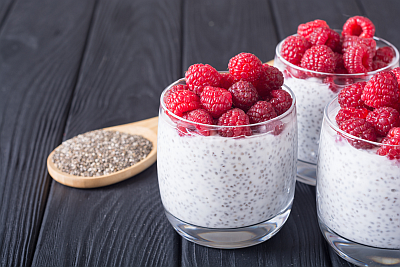
Take this as permission to go nuts! “Nuts and seeds are a great addition to any meal,” shares Amber. “Their flavor and crunch make them perfect for snacking, or for sprinkling on oatmeal and salads.” Flax and chia seeds, walnuts, and almonds are among her favorites. While the fiber from their whole form is ideal, you can also enjoy these good fats as cooking oils made from sunflowers, safflowers and peanuts.
Heart benefits: Like with fish, nuts and seeds offer up omega-3 and omega-6 fatty acids, which have several heart-healthy effects such as reducing inflammation, and lowering bad cholesterol (LDL) while increasing good cholesterol (HDL).
Recipe to try: Vanilla Chia Pudding
7. Avocados
They may be higher in calories, but avocados still earn their place in a healthy diet. “Avocados are full of healthy fats and fiber to help you feel satisfied for longer,” says Kelley Magowan, Aramark RDN. “I like to use them as a topping for sandwiches. Just don’t go overboard.”
Heart benefits: These fruits are a good source of heart-healthy monounsaturated fats plus potassium, a nutrient that’s essential to good heart health.
Recipe to try: Sheet Pan Breakfast with Avocados
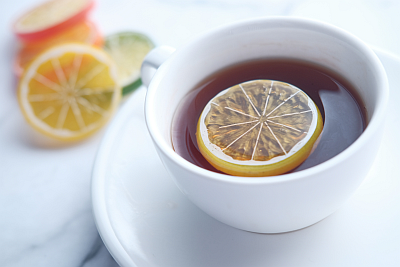
8. True Tea
You’ll see a lot of “tea” beverages out there, but true tea comes from the camellia sinesis plant. “Drinking unsweetened brewed tea—whether white, green, or black—can support heart health as part of a balanced diet,” states Joy Dubost, PhD, RDN, Head of Nutrition for Unilever North America, makers of famous teas such as Lipton and TAZO.
Heart benefits: Tea is a good source of compounds called flavonoids that have been shown to support a healthy heart. Drinking two to three cups per day will help you reach the recommended 200-500 milligrams of flavonoids, also found in wine, cocoa, fruits, and vegetables. Teas keep their nutritional value throughout their shelf life—so check the manufacturer’s recommended serve-by date and you’ll be good to brew.
Recipe to try: Apple-Cucumber Chilled Green Tea
With so many delicious choices, we bet you’re eager to get cooking! Check out our recipe page for more ideas that make the most of these heart-healthy foods.
And for more resources on leading a healthy lifestyle, visit the AHA at heart.org.
Note: Since everyone’s health history and nutritional needs are so different, please make sure that you talk with your doctor and a registered dietitian to get advice about the diet and exercise plan that‘s right for you.

